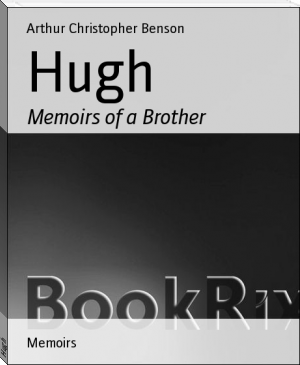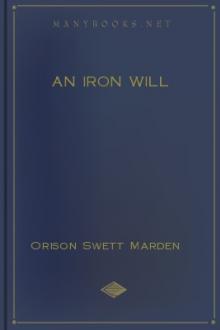Hugh by Arthur Christopher Benson (best ebook reader for ubuntu .txt) 📕

- Author: Arthur Christopher Benson
Book online «Hugh by Arthur Christopher Benson (best ebook reader for ubuntu .txt) 📕». Author Arthur Christopher Benson
Then came the christening, which took place at Sandhurst Church, a mile or two away, to which we walked by the pine-clad hill of Edgebarrow and the heathery moorland known as Cock-a-Dobbie. Mr. Parsons was the clergyman--a little handsome old man, like an abbe, with a clear-cut face and thick white hair. I am afraid that the ceremony had no religious significance for me at that time, but I was deeply interested, thought it rather cruel, and was shocked at Hugh's indecorous outcry. He was called Robert, an old family name, and Hugh, in honour of St. Hugh of Lincoln, where my father was a Prebendary, and because he was born on the day before St. Hugh's Feast. And then I really remember nothing more of him for a time, except for a scene in the nursery on some wet afternoon when the baby--Robin as he was at first called--insisted on being included in some game of tents made by pinning shawls over the tops of chairs, he being then, as always, perfectly clear what his wishes were, and equally clear that they were worth attending to and carrying out.
Then I vividly recall how in 1875, when we were all returning _en famille_ from a long summer holiday spent at Torquay in a pleasant house lent us in Meadfoot Bay, we all travelled together in a third-class carriage; how it fell to my lot to have the amusing of Hugh, and how difficult he was to amuse, because he wished to look out of the window the whole time, and to make remarks on everything. But at Lincoln I hardly remember anything of him at all, because I was at school with my elder brother, and only came back for the holidays; and we two had moreover a little sanctum of our own, a small sitting-room named Bec by my father, who had a taste for pleasant traditions, after Anthony Bec, the warlike Bishop of Durham, who had once been Chancellor of Lincoln. Here we arranged our collections and attended to our own concerns, hardly having anything to do with the nursery life, except to go to tea there and to play games in the evening. The one thing I do remember is that Hugh would under no circumstances and for no considerations ever consent to go into a room in the dark by himself, being extremely imaginative and nervous; and that on one occasion when he was asked what he expected to befall him, he said with a shudder and a stammer: "To fall over a mangled corpse, squish! into a pool of gore!"
When he was between four and five years old, at Lincoln, one of his godfathers, Mr. Penny, an old friend and colleague of my father's at Wellington College, came to stay at the Chancery, and brought Hugh a Bible. My mother was sitting with Mr. Penny in the drawing-room after luncheon, when Hugh, in a little black velvet suit, his flaxen hair brushed till it gleamed with radiance, his face the picture of innocence, bearing the Bible, a very image of early piety, entered the room, and going up to his godfather, said with his little stammer: "Tha-a-ank you, Godpapa, for this beautiful Bible! will you read me some of it?"
Mr. Penny beamed with delight, and took the Bible. My mother rose to leave the room, feeling almost unworthy of being present at so sacred an interview, but as she reached the door, she heard Mr. Penny say: "And what shall I read about?" "The De-e-evil!" said Hugh without the least hesitation. My mother closed the door and came back.
There was one member of our family circle for whom Hugh did undoubtedly cherish a very deep and tender affection from the time when his affections first awoke--this was for the beloved Beth, the old family nurse. Beth became nurse-maid to my grandmother, Mrs. Sidgwick, as a young girl; and the first of her nurslings, whom she tended through an attack of smallpox, catching the complaint herself, was my uncle, William Sidgwick, still alive as a vigorous octogenarian. Henry Sidgwick, Arthur Sidgwick, and my mother were all under Beth's care. Then she came on with my mother to Wellington College and nursed us all with the simplest and sweetest goodness and devotion. For Hugh, as the last of her "children," she had the tenderest love, and lavished her care, and indeed her money, on him. When we were all dispersed for a time after my father's death, Beth went to her Yorkshire relations, and pined away in separation from her dear ones. Hugh returned alone and earlier than the rest, and Beth could bear it no longer, but came up from Yorkshire just to get a glimpse of Hugh at a station in London as he passed through, had a few words with him and a kiss, and gave him some little presents which she thought he might like, returning to Yorkshire tired out but comforted. I have always thought that little journey one of the most touching and beautiful acts of love and service I have ever heard of. She was nearly eighty at the time.
In early days she watched over Hugh, did anything and everything for him; when he got older she used to delight to wait on him, to pack and unpack for him, to call him in the mornings, and secretly to purchase clothes and toilet articles to replace anything worn out or lost. In later days the thought that he was coming home used to make her radiant for days before. She used to come tapping at my door before dinner, and sit down for a little talk. "I know what you are thinking about, Beth!" "What is it, dear?" "Why, about Hugh, of course! You don't care for anyone else when he is coming." "No, don't say that, dear--but I _am_ pleased to think that Master Hugh is coming home for a bit--I hope he won't be very tired!" And she used to smooth down her apron with her toil-worn hands and beam to herself at the prospect. He always went and sat with her for a little in the evenings, in her room full of all the old nursery treasures, and imitated her smilingly. "Nay, now, child! I've spoken, and that is enough!" he used to say, while she laughed for delight. She used to say farewell to him with tears, and wave her handkerchief at the window till the carriage was out of sight. Even in her last long illness, as she faded out of life, at over ninety years of age, she was made perfectly happy by the thought that he was in the house, and only sorry that she could not look after his things.
Beth had had but little education; she could read a little in a well-known book, but writing was always a slow and difficult business; but she used slowly to compile a little letter from time to time to Hugh, and I find the following put away among the papers of his Eton days and schoolboy correspondence:
Addington Park,
[? _Nov._ 1887] _Tuesday._
Dearest,--One line to tell you I am sending your Box
to-morrow Wednesday. I hope you will get it before tea-time. I
know you will like something for tea, you can keep your cake for
your Birthday. I shall think about you on Friday. Everybody has
gone away, so I had no one to write for me. I thought you would
not mind me writing to you.--Dearest love from your dear
Beth.
The dear Beth lived wholly in love and service; she loved just as she worked, endlessly and ungrudgingly; wherever Beth is, she will find service to render and children to love; and I cannot think that she has not found the way to her darling, and he to her.
III
TRURO
We all went off again to Truro in 1877, when my father was made Bishop. The tradition was that as the train, leaving Lincoln, drew up after five minutes at the first small station on the line, perhaps Navenby, a little voice in the corner said: "Is this Truro?" A journey by train was for many years a great difficulty for Hugh, as it always made him ill, owing to the motion of the carriage.
At Truro he becomes a much more definite figure in my recollections. He was a delicately made, light-haired, blue-eyed child, looking rather angelic in a velvet suit, and with small, neat feet, of which he was supposed to be unduly aware. He had at that time all sorts of odd tricks, winkings and twitchings; and one very aggravating habit, in walking, of putting his feet together suddenly, stopping and looking down at them, while he muttered to himself the mystic formula, "Knuck, Nunks." But one thing about him was very distinct indeed, that he was entirely impervious to the public opinion of the nursery, and could neither be ridiculed nor cajoled out of continuing to do anything he chose to do. He did not care the least what was said, nor had he any morbid fears, as I certainly had as a child, of being disliked or mocked at. He went his own way, knew what he wanted to do, and did it.
My recollections of him are mainly of his extreme love of argument and the adroitness with which he conducted it. He did not intend to be put upon as the youngest, and it was supposed that if he was ever told to do anything, he always replied: "Why shouldn't Fred?" He invented an ingenious device which he once, and once only, practised with success, of goading my brother Fred by petty shafts of domestic insult into pursuing him, bent on vengeance. Hugh had prepared some small pieces of folded paper with a view to this contingency, and as Fred gave chase, Hugh flung two of his papers on the ground, being sure that Fred would stop to examine them. The ruse was quite successful, and while Fred was opening the papers, Hugh sought sanctuary in the nursery. Sometimes my sisters were deputed to do a lesson with him. My elder sister Nelly had a motherly instinct, and enjoyed a small responsibility. She would explain a rule of arithmetic to Hugh. He would assume an expression of despair: "I don't understand a word of it--you go so quick." Then it would be explained again: "Now do you understand?" "Of course I understand _that_." "Very well, do a sum." The sum would begin: "Oh, don't push me--don't come so near--I don't like having my face blown on." Presently my sister with angelic patience would show him a mistake. "Oh, don't interfere--you make it all mixed up in my head." Then he would be let alone for a little. Then he would put the slate down with an expression of despair and resignation; if my sister took no notice he would say: "I thought Mamma told you to help me in my sums? How can I understand without having it explained to me?" It was impossible to get the last word; indeed he used to give my sister Maggie, when she taught him, what he called "Temper-tickets," at the end of the lesson; and on one occasion, when he was to repeat a Sunday collect to her, he was at last reported to my mother, as being wholly





Comments (0)